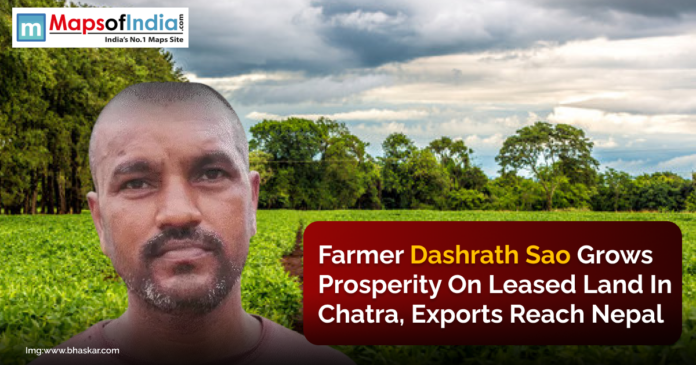In a world where a lot of small farmers are concerned with increasing expenses and declining profits, Dashrath Sao, a farmer of Chatra district of Jharkhand, has walked an exceptional path to success. Dashrath had restricted access to his home farmland, so he decided to make a risky move; he rented out some 23 acres of agricultural land, which were distributed among three villages, such as Gerua, Lamta and Masuria. He invested around ₹4 to ₹5 lakh at a rate of ₹12,000 to ₹15,000 per acre and made the desolate plots into green land and planted a wide range of vegetables that are high in demand.
The farm that belongs to Dashrath now provides tomatoes, cabbage, capsicum, cucumber and watermelons that are produced with meticulous planning and hard work. His pragmatic attitude towards the contemporary agricultural proceedings, his use of seasonal crops, and his knowledge of market requirements have served an important purpose in attaining a steady increase in his operations. The fact that Dashrath can cultivate crops in leased farms is not the only distinguishing factor between him and the many other farmers. It is also his knack for reaching out to customers and stretching his market beyond the mandis in the region.
Today, not only is he providing vegetables to the households in Jharkhand, but also in Nepal. His success shows that when one is determined, innovative, and a risk-taker with calculative steps, they can even depict the history of success in spite of being landless farmers.
The path was not smooth. Dashrath had to break through initial scepticism, the high cost of inputs and the logistical challenge of having varied pieces of land all over. The villages all had their challenges of logistics and operation, such as irrigation and soil excavation, as well as labor and transportation. However, through the experience gained, he has created a network of farm workers and local suppliers and even went ahead to establish connections with traders who assist in delivering his produce to the Nepal markets.
His farms have gained a reputation for the quality of watermelons due to their large size and their sweetness, tomatoes in quality and capsicum in freshness. These qualities have enabled Dashrath to attract repeat customers and secure seasonal deals. The farm revenue that he enjoys through consistent earnings has not only rendered him financially stable but has also generated employment for the people in the location. On his farms, dozens of daily-wage workers are hired during the peak harvesting seasons.
The story of Dashrath Sao should inspire anyone and remind them that there is more than one path to success in agriculture that does not involve land ownership. To reap huge returns, you have to imagine and work hard on leasing land and making it your own. Other marginal and landless farmers in Chatra and other surrounding districts are now planning to adopt the same model of cultivation as inspired by his story.
Dashrath has taken on the odds and challenged traditional farming by being an example of contemporary tenacity in the field of farming. His work has not only been of help to his family but has also started developing a larger story of possibilities and development for farmers in Jharkhand. Chatra and Nepal, the other side of Nepal, Dashrath Sao is reasonably prosperous, one vegetable at a time.










